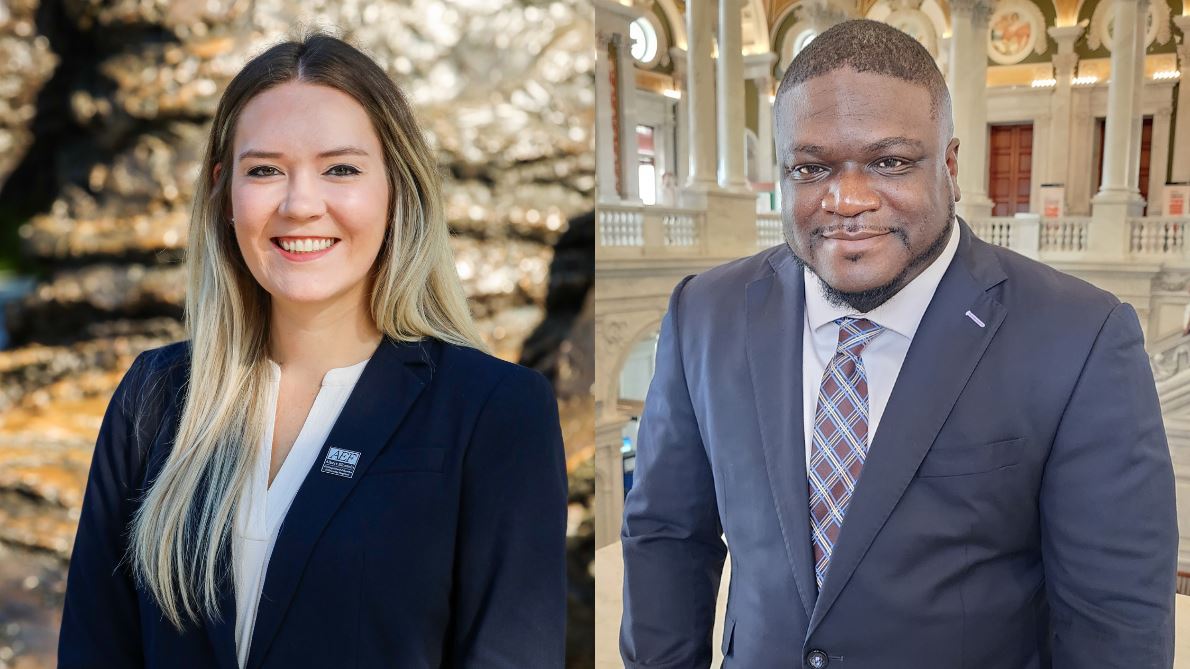Library Welcomes Science and Social Studies Teachers for New School Year
New Einstein Fellow and Teacher-in-Residence Arrive in Washington
The Library of Congress began the 2023-2024 school year by welcoming two teachers to its Capitol Hill campus.
Kelsey Beeghly, a science curriculum and assessment coordinator from Orlando, Florida, will serve as the Library’s 2023-2024 Albert Einstein Distinguished Educator Fellow.
Tyron Bey, a middle school social studies teacher from Prince George’s County, Maryland, has been named the 2023-2024 Teacher-in-Residence at the Library of Congress.
Beeghly and Bey will work closely with staff members in the Library’s Center for Learning, Literacy and Engagement to help make primary sources from the Library’s collections more accessible for teachers, students and families throughout the United States. They will assist in developing materials and experiences for other educators, and collaborate in the creation of a space in the Thomas Jefferson Building’s future Learning Center for families and student groups.
“My colleagues and I are thrilled to work with Kelsey and Tyron this year,” said Lee Ann Potter, director of the Library’s Professional Learning and Outreach Initiatives Office. “We are confident that their classroom experience and familiarity with student interests will help us identify treasures in the Library collections that can be used as powerful teaching tools across the curriculum.”
A former airman in the U.S. Air Force, Bey has taught in Washington, D.C., and Richmond, Virginia public schools, and has worked with the Boys and Girls Clubs of Metro Richmond. Bey will use the Library's primary sources to create engaging lessons about Civil Rights and migration from Central and South America to the United States.
An alumna of Teach for America, Beeghly has taught middle and high school science in Brooklyn, New York, and Florida. Beeghly has an interest in teaching the history and nature of science, the focus area of her doctorate in science education from the University of Central Florida.
This is the sixth year that the Library is hosting an Albert Einstein Fellow. Administered by the U.S. Department of Energy, the fellowship provides a unique opportunity for accomplished K-12 educators in the Science, Technology, Engineering and Math (STEM) fields to serve in the national education arena. Beeghly and the other Einstein fellows will spend 11 months working in federal agencies or in U.S. congressional offices, applying their extensive knowledge and classroom experiences to national education program, and/or education policy efforts. For more information about the Albert Einstein Distinguished Educator Fellowship, visit science.energy.gov/wdts/einstein/.
Since 2000, the Library has recruited educators to work with its staff to help teachers and school librarians incorporate the Library’s digitized primary sources into high-quality instruction. Teachers-in-Residence have helped the Library bring its collections and powerful strategies for integrating them into classrooms across the country. Application information for next year's Teacher-in-Residence will be announced on the Library's Teaching with the Library blog in the early spring.
The Library of Congress is the world’s largest library, offering access to the creative record of the United States—and extensive materials from around the world—both on-site and online. It is the main research arm of the U.S. Congress and the home of the U.S. Copyright Office. Explore collections, reference services and other programs and plan a visit at loc.gov; access the official site for U.S. federal legislative information at congress.gov; register creative works of authorship at copyright.gov; and use its specialized educational resources at loc.gov/teachers/.
###
PR 23-083
09-19-2023
ISSN 0731-3527

